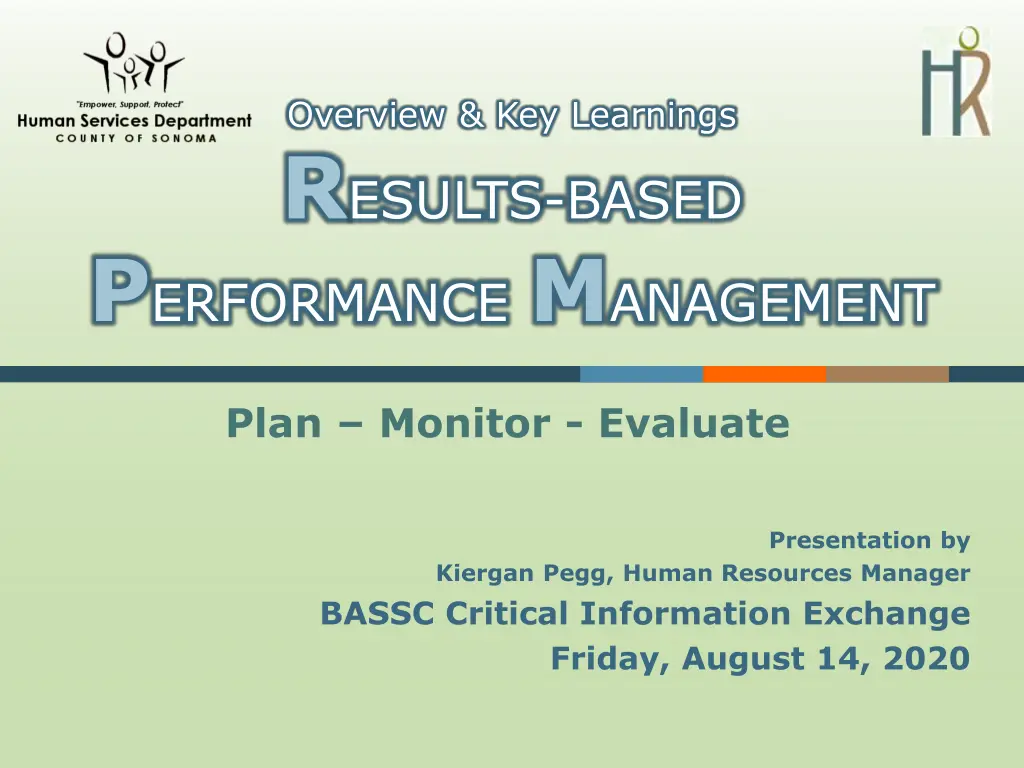
Effective Strategies for Results-Based Performance Management
Explore key learnings and best practices in results-based performance management, including fair evaluations, transitioning from old to new appraisal methods, planning employee work effectively, overcoming challenges, and fostering regular communication for success.
Download Presentation

Please find below an Image/Link to download the presentation.
The content on the website is provided AS IS for your information and personal use only. It may not be sold, licensed, or shared on other websites without obtaining consent from the author. If you encounter any issues during the download, it is possible that the publisher has removed the file from their server.
You are allowed to download the files provided on this website for personal or commercial use, subject to the condition that they are used lawfully. All files are the property of their respective owners.
The content on the website is provided AS IS for your information and personal use only. It may not be sold, licensed, or shared on other websites without obtaining consent from the author.
E N D
Presentation Transcript
Overview & Key Learnings RESULTS-BASED PERFORMANCE MANAGEMENT Plan Monitor - Evaluate Presentation by Kiergan Pegg, Human Resources Manager BASSC Critical Information Exchange Friday, August 14, 2020
Employees wanted evals that are: fair across employees in same job less about their supervisors opinions and more based on objective performance criteria Enabling telework program pre- Covid Management needed to trust the work was still getting done. 2
Old vs. New Performance Appraisal (old) Performance Management (RPM) Occasional Highly subjective Competency-based Focuses on the past Continuous Data-driven Results-based Forward looking 3
Plan the Work Employee and supervisor complete the Performance Planner: Set performance standards & goals Establish resources needed to achieve goals Create Professional Development Plan Evaluate the Work Monitor the Work 4
PLAN THE WORK Core Responsibilities SMART Goals & Standards Specific Measurable Attainable Relevant Time-based Measurement data Professional Development Plan Not everything that can be counted counts, and not everything that counts can be counted. - A. Einstein 5
Two key challenges Developing standards takes concerted effort and skill Data collection and reporting Best Practices: Develop a champion with the skills and aptitude Keep data gathering simple and close to the employee 6
Plan the Work Employee and supervisor meet regularly: Discuss results to date Remove barriers to achieving standards Review Professional Development Plan Evaluate the Work Monitor the Monitor the Work Work 7
Structure for regular communication Performance conferencing different from case conferencing Core competency for a supervisor 8
Employee owns the data and their own development Come prepared to report on Process Standards Project Goals Professional Development Performance Dashboard or other reporting format 9
Plan the Work Employee and supervisor: Discuss past year s performance Set goals for next period in Performance Planner Review & update Professional Development Plan Evaluate the Work Evaluate the Work Monitor the Work 10
Review past years performance No surprises Clear criteria for exceeding goals Department-wide Standards of Conduct Complete a new Performance Planner Set goals for next performance period Most goals simply carried forward Establishes clear expectations! 11
Two hardest parts: Developing standards takes skill & persistence Gathering & Reporting Data Must have a champion in organization to establish data systems Best Practices: Focus on measures of quality! Keep data collection simple and close to the worker Write it down and it is more likely to get done! 12
The real reason . . . maximum independence and well- being for individuals and families HSD Mission Statement 13






















